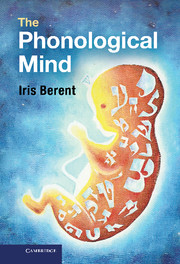Book contents
- Frontmatter
- Contents
- Figures
- Tables
- Copyright acknowledgements
- Preface
- Part I Introduction
- Part II Algebraic phonology
- Part III Universal design
- Part IV Ontogeny, phylogeny, phonological hardware, and technology
- 9 Out of the mouths of babes
- 10 The phonological mind evolves
- 11 The phonological brain
- 12 Phonological technologies: reading and writing
- 13 Conclusions, caveats, questions
- References
- Index
12 - Phonological technologies: reading and writing
Published online by Cambridge University Press: 05 February 2013
- Frontmatter
- Contents
- Figures
- Tables
- Copyright acknowledgements
- Preface
- Part I Introduction
- Part II Algebraic phonology
- Part III Universal design
- Part IV Ontogeny, phylogeny, phonological hardware, and technology
- 9 Out of the mouths of babes
- 10 The phonological mind evolves
- 11 The phonological brain
- 12 Phonological technologies: reading and writing
- 13 Conclusions, caveats, questions
- References
- Index
Summary
Core knowledge systems outline not only our early, instinctive, and universal understanding of the world but also provide scaffolds for subsequent learning. Like the core systems of number, physics, and social knowledge, our instinctive phonological knowledge sets the stage for the cultural invention of reading and writing. This chapter outlines the intimate link between early phonological competence and those later “phonological technologies.” We will see that all writing systems – both conventional orthographies and the ones invented spontaneously by children – are based on phonological principles. Reading, in turn, entails the automatic decoding of phonological structure from print. Skilled reading recruits the phonological brain network that mediates spoken language processing. Moreover, dyslexia is typically marked by hereditary deficits to phonological processing and phonological awareness. The role of instinctive phonology as a scaffold for reading and writing is in line with its being viewed as a system of core knowledge.
Core knowledge as a scaffold for mature knowledge systems
In previous chapters, we have seen that phonological systems manifest a unique, potentially universal design that is evident already in early development. The special design of the phonological system is in line with the characteristics of core knowledge systems documented in numerous other domains, including knowledge of number, agency, space, and morality (Bloom, 2010; Carey, 2009; Carey & Spelke, 1996; Hamlin, Wynn & Bloom, 2010; Hamlin et al., 2007; Hauser & Spelke, 2004; Spelke, 2000). These early knowledge systems each includes distinct representational primitives and combinatorial principles that are innate, universal and domain specific. For example, infants as young as 4 months of age manifest rudimentary knowledge of number – they can represent the precise number of up to four objects (larger numbers are encoded approximately), and they can perform addition and subtraction operations on such small sets. In the domain of physics, young infants possess intuitive knowledge that leads them to expect objects to move cohesively (without disintegrating) and continuously (without jumping from one point to another and without intersecting other objects) as a result of contact with other objects. Other principles of morality might underlie 3-month-old infants’ preference for social “helpers” (a character helping another climb up the hill) to “hinderers” (a character who interferes with the climber’s efforts).
- Type
- Chapter
- Information
- The Phonological Mind , pp. 280 - 306Publisher: Cambridge University PressPrint publication year: 2013



